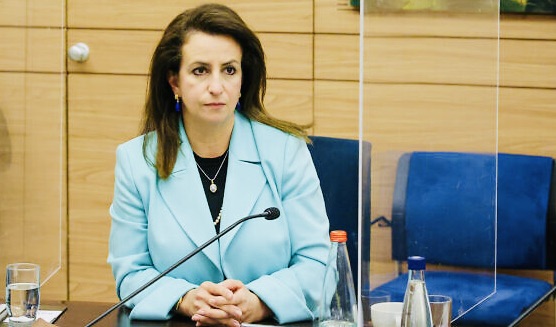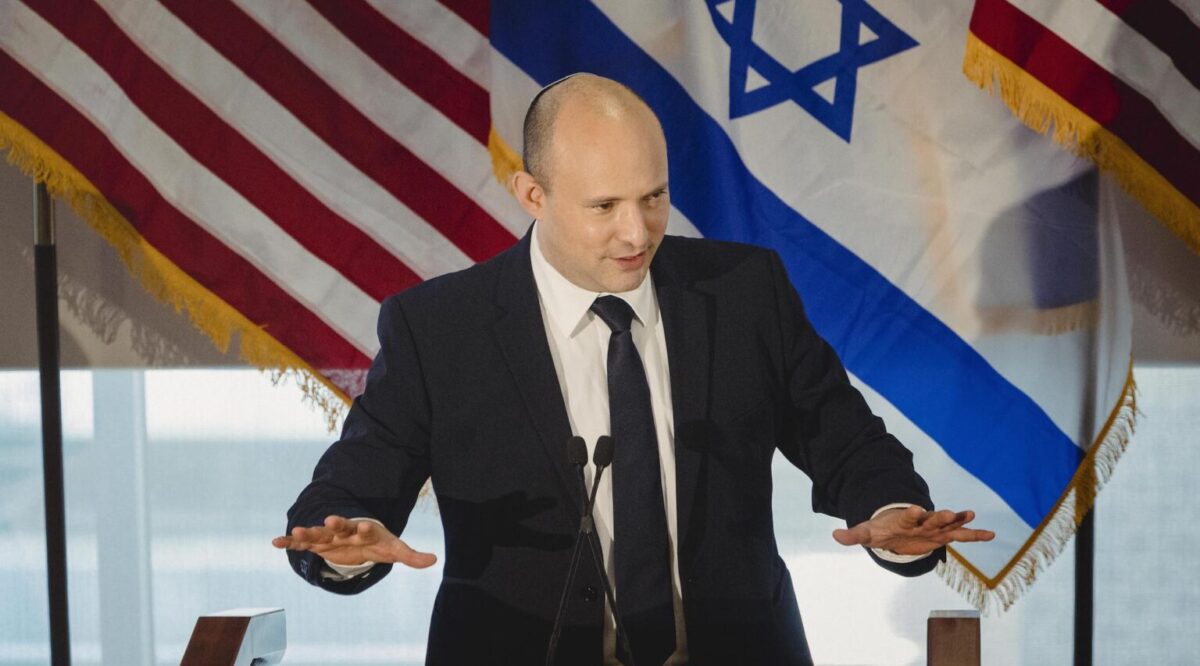A year after forming what is probably Israel’s most ideologically diverse government, Prime Minister Naftali Bennett is clinging to power by the skin of his teeth.
As of now, he controls only 60 of the 120 seats in the Knesset, allowing him to govern but leaving his government potentially unstable and vulnerable to upheaval and collapse.
Bennett, the leader of the right-wing Yamina Party, formed the fragile coalition in partnership with Yair Lapid, the head of the centrist Yesh Atid Party and the alternate prime minister and foreign minister.
They cobbled it together with the support of a rainbow of five right-wing, centrist and left-wing parties, plus one Arab party which holds the balance of power, much to the chagrin of right-wing Israeli nationalists.
With his accession to the prime ministership, Bennett dislodged his long-serving predecessor, Benjamin Netanyahu, and relegated him to the position of opposition leader.
Bennett, whose own party holds only six seats, has weathered three crises in the past few months, buoying Netanyahu’s confidence that he can bring down Bennett’s government, dissolve parliament, call the fifth election in three years, and regain his old job.
Netanyahu may be too optimistic. According to recent Channel 12 survey, Netanyahu and his allies would win 59 seats, two short of a clear majority, if elections were held today.

The first coalition crisis occurred in April when Idit Silman, the coalition whip and an MK from Bennett’s own party, quit after griping about his leadership and the composition and values of the coalition. She was particularly upset by its reliance on Mahmoud Abbas, the leader of the Islamist Ra’am Party, which holds four seats and is the first Arab party to join an Israeli government.
Silman called for a new government consisting of “nationalist, Jewish (and) Zionist” lawmakers. With her defection, Bennett lost his razor-thin majority of 61 seats, hampering his ability to pass legislation or a new budget.
Lapid appeared unfazed by Silman’s departure, claiming the crisis could be “managed” and boasting the government was working on behalf of all Israelis and for the good of the country.
No sooner had Silman departed than Abbas suspended Ra’am’s participation in the coalition. He warned that violent clashes between the police and Palestinian demonstrators at the Temple Mount complex in East Jerusalem, which resulted in injuries to 150 Palestinians, could jeopardize the longevity of the government.

Abbas issued this warning after one of his colleagues, Mazen Ghnaim, said that “the actions of the security forces” at the Al- Aqsa mosque raised the fundamental question whether the government had “a right to exist.”
In the wake of Ghnaim’s threat, Abbas assured Bennett his party would not topple the government. “We want to see political achievements and strengthen the political position of our Arab society,” he said, referring to the substantial subsidies the government has poured into the Arab community, which comprises 21 percent of Israel’s population.
Several days later, on May 11, Abbas rejoined the government, justifying his decision on the urgent need to resolve the chronic problems facing Israeli Arabs. These run the gamut from inequality in municipal services and employment to rampant crime and gun violence in Arab villages and towns.
On May 19, however, the coalition encountered turbulence yet again when Ghaida Rinawie Zoabi, a member of the left-wing Meretz Party, resigned while implying she would vote with the government from the outside.

She cited two reasons for her dissatisfaction — police intervention at the Al Aqsa mosque and the police assault on mourners at the funeral of Palestinian American journalist Shireen Abu Akleh.
With her defection, the opposition won control of 61 Knesset seats, enough to dissolve the government and call a fresh election.
Pleased by this development, Netanyahu lambasted the government of “surrender and weakness.” Netanyahu’s glee was short-lived.
On May 22, Zoabi returned to the government, saying she wanted to avoid a scenario whereby Netanyahu and his bloc would return to office.
Despite Zoabi’s volte-face, the government may yet collapse, judging by Bennett’s open letter to the electorate on June 3 in which he appealed for the public’s support.
Claiming his government has brought stability after four inconclusive elections, Bennett wrote that Israel had been gripped by “chaos” and “paralysis” until he and his associates restored “functionality and growth.”

Whether this message will resonate with Israelis and thereby enable Bennett to preserve his government remains to be seen.
In the Knesset, however, his prospects look rather bleak. On June 6, Ghnaim and Zoabi were among 58 members of parliament who successfully defeated a government bill to further extend Israeli criminal and civil law to Israelis living in the West Bank. Justice Minister Gideon Sa’ar regarded the vote as a litmus test of the government’s viability, and may yet leave the coalition to join forces with his nemesis, Netanyahu.
Meanwhile, four of Bennett’s key assistants have stepped down in the last month. Matan Sidi, his diplomatic spokesman, announced his resignation on June 6, following the resignations of his diplomatic adviser, Shimrit Meir, of his chief of staff, Tal Gan-Zvi, and of his office manager and personal assistant, Naomi Sasson.
It is not clear whether their departures are connected to the coalition crisis, but as far as Bennett is concerned, the optics are bad.
